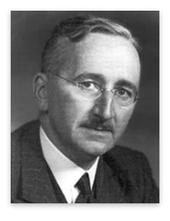Hayek was born in Vienna to a family of prominent intellectuals working in the fields of statics and biology. His father published a major botanical treatise while working as a doctor in the government's social welfare system. On his mother's side, he was second cousin to the philosopher Ludwig Wittgenstein . At the University of Vienna , he earned doctorates in law and political science in 1921 and 1923 respectively, and he also studied psychology and economics with keen interest. Initially sympathetic to socialism, Hayek's economic thinking was transformed during his student years in Vienna through attending Ludwig von Mises ' private seminars along with Fritz Machlup and other young students. He was a student of Friedrich von Wieser .
Hayek worked as a research assistant to Prof. Jeremiah Jenks of New York University from 1923 to 1924. He then worked for the Austrian government helping to work out the legal and economic details of the international treaty ending World War I . Hayek then set up and became director of the Austrian Institute for Business Cycle Research before joining the faculty of the London School of Economics at the behest of Lionel Robbins in 1931. Unwilling to return to Austria after its annexation to Nazi Germany, Hayek became a British citizen in 1938, a status he held for the remainder of his life.
In the 1930s, Hayek enjoyed a considerable reputation as a leading economic theorist, but his models were not received well by the followers of John Maynard Keynes . Debate between the two schools of thought continues to this day. Hayek's positions have gained in currency in the US and UK since the late 1970s; support for Hayek grew as conservative politicians in those countries' governments consolidated power. In 1950, Hayek left the London School of Economics for the University of Chicago , becoming a professor in the Committee on Social Thought (he was barred from entering the Economics department because of his Austrian economic views by one member whom he would not name and many speculate was Frank Knight ). He found himself at Chicago amongst other prominent economists , such as Milton Friedman , but, by this time, Hayek had turned his interests towards political philosophy and psychology — although he continued to work on economics issues, and most of his economic notes from this period have yet to be published. From 1962, until his retirement in 1968, he was a professor at the University of Freiburg .
In 1974, he shared the Nobel Memorial Prize in Economics , causing a revival of interest in the Austrian school of economics. In 1984, he was appointed as a member of the Order of the Companions of Honour by Queen Elizabeth II of the United Kingdom on the advice of British Prime Minister Margaret Thatcher for his 'services to the study of economics'. Later, he was a visiting professor at the University of Salzburg . Hayek died in 1992 in Freiburg, Germany.
Go here to read more.»-(¯`v´¯)-» Design your MySpace with MyLook «-(¯`v´¯)-«